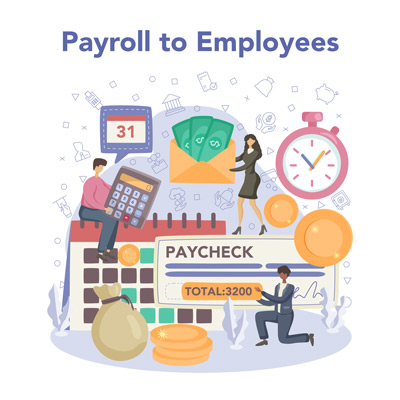
Welcome to the PAYE / Payroll Investigation page at Everest and Co Accountants, where we provide specialised support for individuals and businesses facing PAYE and Payroll investigations conducted by HMRC. Explore how we can assist you in navigating the complexities of PAYE and payroll compliance effectively.
What is PAYE / Payroll Investigation and Different Types of Investigations by HMRC
A PAYE / Payroll investigation by HMRC involves a detailed examination of an individual or business's compliance with Pay As You Earn (PAYE) and payroll regulations. HMRC conducts various types of investigations, including:
- Routine PAYE Compliance Checks: Regular assessments to ensure accurate payroll reporting and compliance with PAYE regulations.
- Employment Status Reviews: Focus on determining the correct employment status of individuals for tax and National Insurance Contributions (NICs) purposes.
- National Minimum Wage Investigations: Ensuring compliance with national minimum wage laws, including accurate wage payments and records.
How Serious is it
A PAYE / Payroll investigation by HMRC is a serious matter with potential consequences that can include:
- Financial Penalties: Non-compliance with PAYE and payroll regulations can result in significant financial penalties imposed by HMRC.
- Fines and Arrears: Inaccurate reporting or payment of taxes through PAYE can lead to fines and arrears owed to HMRC.
- Legal Action: Serious breaches, such as deliberate misreporting or evasion, may result in HMRC pursuing legal action, including potential criminal charges.
- Reputational Risk: An investigation can tarnish the reputation of individuals or businesses, affecting relationships with employees, stakeholders, and clients.
Common Pitfalls by Clients
During PAYE / Payroll investigations conducted by HMRC, individuals and businesses may unknowingly fall into common pitfalls that can complicate compliance issues and prolong the investigative process. Understanding these pitfalls is crucial to proactively address and rectify any compliance challenges. Here are some common pitfalls often encountered by clients during PAYE / Payroll investigations:
- Incorrect Employee Classification: Misclassifying employees as contractors or vice versa can lead to issues with tax deductions, National Insurance Contributions (NICs), and overall compliance. Incorrect employee classification may result in underpayment or overpayment of taxes, triggering HMRC scrutiny during investigations.
- Inaccurate Reporting of Wages and Benefits: Errors in reporting employee wages, bonuses, benefits, or expenses can lead to discrepancies in tax calculations. Inaccurate reporting may result in underpayment of taxes, penalties for non-compliance, and potential fines during PAYE investigations.
- Failure to Update Employee Information: Neglecting to update employee information, such as changes in salaries, tax codes, or personal details, can lead to inaccuracies in payroll calculations. Failure to keep employee records current can contribute to compliance issues and inaccuracies in tax reporting.
- Poor Record-Keeping Practices: Inadequate record-keeping practices, such as incomplete or disorganised payroll records, can hinder the investigation process and complicate compliance assessments. Lack of detailed records may lead to difficulties in verifying payments, deductions, and compliance with PAYE regulations.
- Mismanagement of National Insurance Contributions: Mishandling National Insurance Contributions, including failures to deduct or report NICs accurately, can result in compliance issues during PAYE investigations. Incorrect NIC calculations may lead to fines, penalties, and disputes with HMRC regarding employee contributions.
- Non-Compliance with Reporting Deadlines: Missing reporting deadlines for PAYE and payroll submissions can trigger investigations by HMRC. Non-compliance with reporting requirements may result in penalties, fines, and increased scrutiny during investigations, highlighting the importance of timely and accurate submissions.
- Underpaying Employees: Failing to pay employees the correct wages or benefits can lead to legal and compliance issues. Underpayment may result in disputes, fines, and penalties during PAYE investigations.
- Not Meeting National Minimum Wage Requirements: Failure to comply with national minimum wage regulations can lead to legal consequences and penalties. Not meeting minimum wage requirements may trigger investigations and compliance issues with HMRC.
- Discrepancy in Business Operating Hours vs. Employee Worked Hours: Discrepancies between the business's operating hours and the number of hours worked by employees can raise red flags during investigations. Inaccurate tracking of employee hours may lead to compliance issues and discrepancies in payroll calculations.
By being aware of these common pitfalls and taking proactive measures to address them, clients can enhance their compliance practices, streamline the investigation process, and mitigate potential risks associated with PAYE / Payroll investigations. Seeking professional guidance and implementing robust payroll procedures can help clients navigate the complexities of HMRC investigations effectively and achieve a successful resolution.
General Outcomes
Positive outcomes of a PAYE / Payroll investigation may include:
- Improved Compliance: Correction of errors and enhanced payroll reporting practices.
- Minimised Financial Impact: Resolving discrepancies promptly to reduce financial penalties and arrears.
- Enhanced Processes: Implementation of robust payroll procedures for future compliance.
Negative outcomes could involve:
- Financial Penalties: Fines, arrears, or penalties for non-compliance.
- Reputational Damage: Impact on relationships and business reputation.
- Operational Disruption: Disruptions caused by prolonged investigations or legal actions.
Why Having the Right Approach from the Start Makes a Difference
Adopting the right approach from the beginning of a PAYE / Payroll investigation is crucial to:
- Demonstrate Cooperation: Showing willingness to cooperate with HMRC.
- Mitigate Risks: Addressing issues promptly to reduce financial penalties.
- Ensure Compliance: Streamlining the investigation process for efficiency.
Our approach to Investigation
Navigating a PAYE / Payroll investigation by HMRC can be daunting, but with the right approach and expert guidance, you can effectively address compliance issues and minimise potential risks. Here are the best ways to tackle PAYE / Payroll investigations:
- Promptly Review and Rectify Errors: Conduct a thorough review of your PAYE and payroll records to identify any inaccuracies or discrepancies. Promptly rectifying errors demonstrates a commitment to compliance and can help mitigate potential penalties.
- Maintain Accurate Records: Ensure your payroll records are up-to-date, accurate, and compliant with HMRC regulations. Accurate record-keeping is crucial in demonstrating transparency and facilitating a smooth investigation process.
- Cooperate Fully with HMRC: Respond promptly to any requests for information or documentation from HMRC. Cooperating fully with the investigation demonstrates transparency and a willingness to address compliance issues proactively.
- Seek Professional Advice: Consider engaging expert accountants or tax advisors with experience in PAYE and payroll matters. Professional guidance can help you navigate the complexities of the investigation, assess potential risks, and develop an effective compliance strategy.
- Implement Robust Internal Controls: Enhance your internal controls and procedures to ensure ongoing compliance with PAYE and payroll regulations. Implementing robust controls can help prevent future compliance issues and streamline your reporting processes.
- Regularly Monitor Compliance: Conduct regular audits and reviews of your PAYE and payroll processes to monitor compliance and identify potential issues proactively. Regular monitoring can help you stay ahead of compliance challenges and address them promptly.
- Educate Staff on Compliance: Provide training and guidance to your payroll staff on PAYE regulations, compliance requirements, and best practices. Educating your staff can help prevent errors, improve compliance, and ensure a smooth investigation process.
By following these best practices and taking a proactive approach to PAYE / Payroll investigations, you can position yourself for a successful resolution and mitigate potential risks associated with non-compliance. Remember, seeking professional support and maintaining open communication with HMRC are key elements in tackling PAYE and payroll investigations effectively.
Working with Everest and Co Accountants
Partner with Everest and Co Accountants to navigate PAYE / Payroll investigations effectively, safeguard your compliance, and secure your financial well-being. Contact us today for a free initial consultancy and take proactive steps towards resolving PAYE and payroll-related challenges with confidence and expertise.
Don't hesitate - reach out to us today for a no-obligation initial consultation. Contact us without delay to start a conversation that could safeguard your financial well-being and provide peace of mind. Our team at Everest and Co Accountants is here to offer expert guidance and support tailored to your unique needs. Let's begin with an initial consultation to explore how we can assist you in navigating tax matters and HMRC challenges effectively.
